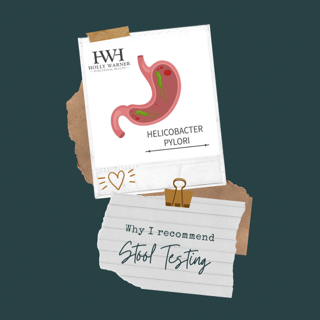First of all let me answer the first question that usually comes up; how do I know if I have H. pylori (Helicobacter pylori)?
Got gas?
Bloating?
How about acid reflux?
Discomfort In the upper abdomen?
Nausea that makes zero sense, oh and you feel WORSE on an empty stomach…burning stomach pain perhaps? Those are telltale signs you might need to be tested for H. pylori.
When we think of “stomach bug” this one probably wasn’t on our gramma’s list.
I wouldn’t stop there though. You want a good, overall picture (by looking at a variety of possibilities for dysbiosis).
- dysbiosis caused by a lack of good flora
- an overgrowth of bacteria that could be considered opportunistic
- a lack of diversity in the types of flora found on the sample.
Something else to consider is do you suffer from symptoms of low HCL (low stomach acid) – H. pylori can lower stomach acid making it uncomfortable to consume dense protein foods. They sort of sit there in the bottom of your stomach feeling like a block of cement. Not to mention the heart burn that is NOT related to too much stomach acid, but actually too little. It can also contribute to stomach ulcers and in some (rare) cases – stomach cancer.
If acidic foods give you trouble (causing gastritis) you could be experiencing the result of H. Pylori; remember our gut is great at letting us know that something is up, if we are smart enough to listen.
Whenever I see a patient with persistent B12 deficiency or iron deficiency (anemia) but no real contributing factors (diet is great or they are already supplementing) I look at two things. Do they have a genetic predisposition or could it be H. pylori.
It used to be said that a urea breath test was the most evidence based option for accuracy for patients who had symptoms but no history of gastric distress, ran a recent course of antibiotics,or were using PPIs (proton pump inhibitors). That was before we had a microarray hybridization technology platform, using whole genome data to simultaneously detect over 300 microorganisms with 99% specificity and 98% sensitivity, unheard of levels of accuracy in the detection of pathogenic microorganisms.
Want to learn more as to WHY the Gut Zoomer is my go to test? CLICK HERE






